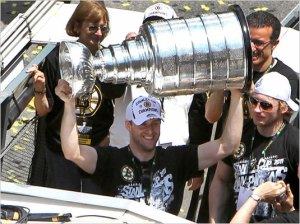It’s that time of the year again, when millions of new college graduates will venture out into the world, nostalgic about the 4 fun-filled years spent in college and timid/anxious about the dreaded concept known as the “Real World.” It wasn’t too long ago that I stood in their place. And it is a scary place. In college, you have way more free time that you could possibly imagine, and ‘bar nights’ consist of Tuesday, Thursday, Friday, Saturday – oh yeah and Monday… and sometimes Wednesday if there’s a holiday, or a game on, or if you dressed yourself successfully.. and don’t forget Sunday, because on those long weekends it’s kind of like a Saturday when you think about it right?? Often I hear concerns from friends who are finishing up their last year of school, and the most prevalent question seems to be, “How bad is life after college?” Well, I’m here to tell you that it ISN’T THAT BAD. It’s actually pretty good. Of course, it isn’t college, so I don’t want to start off with any misconceptions. You will have to work, and you won’t typically have the luxury of skipping a day to go to the beach or to sleep in because you had a rough night. But I think you all knew that.

Taken from Personalbrandingblog.com
Here are 5 ways to stay young after college is over:
1. Know the Difference Between College and Real Life – This is probably the most important tip. Everything else I will tell you is predicated on the assumption that you have this understanding. As I said in the intro, life after college is good, but it isn’t college. Employers aren’t usually OK with you calling in sick every Friday after you’ve gone out clubbing Thursday night, nor will they accept a presentation two weeks late like that sympathetic professor you had. That said, I’m not telling you not to have fun, you just have to be mature enough to get your work done first. Then again, if you’ve graduated, you’re more than likely intelligent enough to make this connection without me having to highlight it. Moving on..
2. Don’t fall into a boring routine – Once you find a steady job, and a place to live, you will likely find yourself falling into a daily/weekly routine. That’s actually a good thing! A routine is a luxury not afforded by the rigor and unpredictability of a college schedule. Most days, I will wake up, eat breakfast (which never happened in college), go to work, go home, eat dinner, and eventually go to sleep (at a reasonable hour… again, never happened in college). It’s nice, and it’s a lot healthier than a 3 hour sleep average and granola bar dinner that you may be used to. However, a routine also lends itself to boredom, and you will soon come to learn that once you fall into said routine, the days/weeks/months will FLY by. The last thing that you want to do is have life pass you by, and the ‘routine’ is the reason that we hear horror stories of people waking up and realizing they wasted their best years. You know when you’re driving somewhere familiar, and then you just get there without remembering the ride? Well, that happens in life too. Break up the routine a few times a week, and do something different. Eat out at a different place, or go to a concert, or join a social sports team… anything, just make sure you consciously do something different each week so that you have something to remember!
3. Force Yourself to Have Fun – This one might sound foolish, but trust me when I say it is not. It’s not at all uncommon for people to make plans with friends for a Friday night, then get home and say, “You know it’s been a rough week, I think I’m going to stay in tonight and watch television.” If that is fun for you, then fine, but my guess is it isn’t the attitude you had in college 🙂 We are all tired after a long week, or haven’t had a chance to grocery shop, or are just not in the mood. But sometimes, you have to force yourself to have fun. Stick to your plans. You’ll be happy that you did. I guarantee you will never say to yourself, “I really wish I had stayed in and watched TV that night, I’ll never know what I missed.” Think about it.

Taken from Google Images
4. Take Risks – This one is pretty self-explanatory, but it’s also important. When you’re young, it’s the perfect (and in many cases, only) time that you can afford to take risks. With your career, with your money, with your life. Once you are settled down with a family and other people to worry about, risk-taking can sometimes become almost irresponsible. But while you are young, with no children, and with plenty of time to make money, take a risk! Of course I’m not saying take stupid risks, they should be calculated and reasonable. But as I mentioned, you never want to have regrets in your life, and if there is a start-up company your friend needs help with, or a job in a different country that you may really enjoy – Do it! Because again, at least then you won’t end up with regrets, and who knows, those might end up to be the best decisions you’ve ever made!
5. Make Vacations Count – Perhaps this last tip is also self explanatory, but it’s not at all something I really considered until I entered the workforce. In college, there is SO much vacation, that students take it for granted. You have your spring break, of course, but then you have the lazy winter break and extended summer break where you are probably working a summer job or an internship but essentially relaxing. Once you start working, your vacation goes down – big time. You will only have 2-3 weeks of time off during the entire year, so what are you going to do with it? Well, I can’t answer that question for you, but whatever it is, make it count, because it’s not a ton. Go somewhere exotic with your friends, or plan long weekends to a beach or to a new city. Planning trips gives you something to look forward to, and it keeps you young.
And there you have it. 5 Tips to Staying Young After College. I hope you find them useful – and I don’t mean to neglect people who have been out of college for a long time, or to make it seem like they somehow lead less exciting lives. Some of the most exciting people I know are much, much older than me, and that’s the type of lifestyle I aspire to when I get older.
For those of you who have been out of school for few years, what would you add? What do you do to stay young and active? I’d love to hear your thoughts.
Follow me on Twitter: @billconnolly










